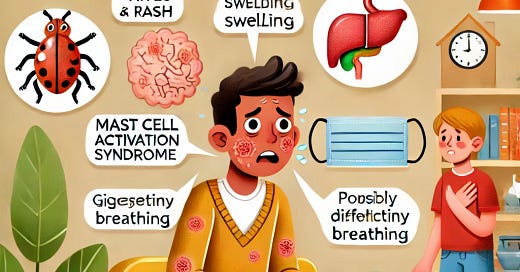TLDR - MCAS is incredibly subjective and difficult to diagnose.
Symptoms
The list of MCAS symptoms is endless, spanning multiple biological systems. Your body (or specific parts of it) perceives harmless substances from your environment or diet as threats. This danger reaction can occur in many different locations, leading to various disruptions in biological processes. This is why the range of symptoms is so large. In short, homeostasis is disrupted because your body is in a state of perceived danger. Note that many of these overlap with CIRS symptoms.
Skin Symptoms:
Itchy skin
Rashes or hives
Flushing (hot, red, or pink skin)
Swelling (angioedema), often of the face, lips, eyes, tongue, or throat)
Gastrointestinal Symptoms:
Nausea
Vomiting
Diarrhea (sometimes alternating with constipation)
Abdominal (belly) pain
Bloating
Cardiovascular Symptoms:
Low blood pressure
Rapid or irregular heartbeat
Dizziness or fainting
Respiratory Symptoms:
Shortness of breath
Wheezing
Nasal congestion
Neurological Symptoms:
Memory loss or trouble thinking (brain fog)
Headaches
Numbness or tingling
Musculoskeletal Symptoms:
Joint pain
Muscle pain
Weakness
Systemic Symptoms:
Anaphylaxis (severe allergic reaction involving multiple symptoms)
Fatigue
General malaise
Diagnosis
Testing: There aren’t great clear cut tests for MCAS. Below are a few options:
Tryptase Levels: Measuring serum tryptase levels, which are typically elevated during an acute mast cell activation event. This is the most common way to diagnose MCAS.
Histamine Levels: Checking for elevated plasma or urine histamine levels.
N-Methylhistamine: A metabolite of histamine, often measured in a 24 hour urine sample.
Note that many people test negative but still believe they have MCAS. In my opinion, MCAS occurs when the body is in a heightened danger response to various environmental factors. Allergists only test for specific responses, leaving many possibilities untested.
Response to Treatment: If symptoms improve with treatments targeting mast cell mediators, this supports an MCAS diagnosis. This includes H1 and H2 antihistamines and mast cell stabilizers like cromolyn sodium, and leukotriene inhibitors.
Ruling Out Other Diagnoses: It's also important to rule out any other potential conditions that could cause similar symptoms to MCAS.



